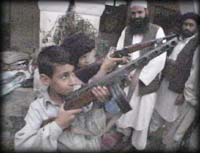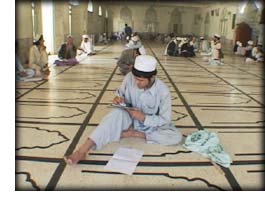 | |||||||
| |||||||
|
A madrassa is an Islamic religious school. Many of the Taliban were educated in Saudi-financed madrassas in Pakistan that teach Wahhabism, a particularly austere and rigid form of Islam which is rooted in Saudi Arabia. Around the world, Saudi wealth and charities contributed to an explosive growth of madrassas during the Afghan jihad against the Soviets. During that war (1979-1989), a new kind of madrassa emerged in the Pakistan-Afghanistan region -- not so much concerned about scholarship as making war on infidels. The enemy then was the Soviet Union, today it's America. Here are analyses of the madrassas from interviews with Vali Nasr, an authority on Islamic fundamentalism, and Richard Holbrooke, former U.S. ambassador to the U.N. (For more on the role of madrassas in producing militant Islamists, see the story of Haroun Fazul.)
You said that the main source of funding for these Islamic extremists-- Or at least the institutions that train them. -- is whom? It's Saudi Arabia and its network of charities and the like. The argument I make is that there is an undercurrent of terror and fanaticism that go hand in hand in the Afghanistan-Pakistan arc, and extend all the way to Uzbekistan. And you can see reflections of it in Bosnia, in Kosovo, in Indonesia, in the Philippines.
What you're saying is that, if we wanted to look for the causes of what's happened -- Al Qaeda and the movement worldwide -- we would have to look to the schools, to the educational system which Saudi Arabia has fostered in the Islamic world? ... In order to have terrorists, in order to have supporters for terrorists, in order to have people who are willing to interpret religion in violent ways, in order to have people who are willing to legitimate crashing yourself into a building and killing 5,000 innocent people, you need particular interpretations of Islam. Those interpretations of Islam are being propagated out of schools that receive organizational and financial funding from Saudi Arabia. In fact, I would push it further: that these schools would not have existed without Saudi funding. They would not have proliferated across Pakistan and India and Afghanistan without Saudi funding. They would not have had the kind of prowess that they have without Saudi funding, and they would not have trained as many people without Saudi funding. .... What is a madrassa? It's a seminary. It's where students of different ages, as young as nine or ten, go to learn religious education and to be schooled first of all in reading and then in religious studies. In the old times, it substituted for regular elementary education and higher education, and ultimately produces quote, unquote, clerics. In other words, scholars, preachers, you know, religious community leaders who conduct the religious affairs of a community. But you're saying the influence of the Saudis in these schools has been to create a certain kind of Islam, not your mainstream Islam? Well, first of all, because of the Afghan war, we have a new kind of madrassa emerging in Pakistan-Afghanistan area. And throughout Central Asia, right? They've been spreading throughout Central Asia, but there have been Central Asian students, Filipino students, Indonesian students, Nigerian students, Arab students, thanks to scholarship funding provided from Persian Gulf and Saudi Arabia, that have been going to these schools. And I'm also told in Kurdistan and all kinds of places. All kinds of places. Now these Afghan madrassas, how they differ from the traditional madrassas is that they were not really so much concerned about scholarship. They were more concerned about training religious fighters who would go into the Afghan field and fight. I mean, the phenomenon of Taliban, meaning religious seminary students-- That's what the word means.
So you have the whole rise of, if you would, Islamic West Points, or Islamic military camps, Islamic guerilla camps along the border, which mix a dosage of Islam with a lot of military training. Then they also train a new generation of mosque leaders and clerics who go open their own madrassas or go populate mosques from Jakarta to Rabat. But I thought that in the 1980s, when the Saudis started to really spend a lot of money on this, that they were doing this in a sense with our approval to help isolate Iran and the rise of fundamentalist Shi'ism? Yes. Well, the first generation of madrassas, [from] which many of these Northern Alliance people also came, were organized to fight the Afghan war against the Soviet Union. This was obviously the cause. So they were basically recruiting schools? They were recruiting, organizing schools which also use Islamic ideology as a way of creating a very efficient guerilla army with a very clear anti-communist ideology. So what's wrong with that? Nothing. We're dealing with the sort of unintended consequences of that, and particularly because the United States didn't really properly clean up after it left Afghanistan. ..... Who goes to these madrassas? They are recruited from among the lower classes and lower-middle classes. In the Afghan-Pakistan arena, there are members of Pashtun tribes who enroll in these madrassas. There are peasant children from the peasant backgrounds. And occasionally there are also lower middle-class children they are very able to recruit among people in Pakistan particularly who don't have any access to any other kind of schooling. ... That's why the ideology that's propagated by these schools is so significant in shaping minds in the Muslim world. So if regular schooling is not schooling people, and schools that propagate fanaticism are schooling people, it doesn't take a brain surgeon to figure out what would be the impact on society.
I think that one of the tragedies of this story is that the Saudi Arabians exported their problem by financing the schools, the madrassas, all through the Islamic world. I saw this in Uzbekistan a few years after Uzbekistan got out of the Soviet Union, became an independent state in cities like Tashkent and Samarkand, where the Saudis were funding these schools teaching Koranic studies and creating a class of people for whom education was simply the Holy Book, the Koran. ... What happened here was that the Saudi Arabian government had two wings. The mainland Saudi leadership went into financial issues, defense issues, and they controlled the elite establishment in order to purchase support. From the more fundamentalist religious groups, they gave certain other ministries, the religious ministries, education ministries, to more fundamentalist Islam leaders. And that's how the split occurred. So the Saudi government was, to a certain extent, pursuing internally inconsistent policies throughout this period -- reaching out to the West with sophisticated, well educated, internationally minded leaders like its foreign minister, like its ambassador in Washington and others. At the same time, it was funding with this vast oil revenue a different set of efforts: education, which was narrowly based in the Koran. ...
home · introduction · interviews · analyses · haroun fazul · chronology photo copyright © afp/corbis | |||||||

 For instance, in one madrassa in Pakistan, I interviewed 70 Malaysian and Thai
students who are being educated side by side with students who went on to the
Afghan war and the like. These people return to their countries, and then we
see the results in a short while. ... At best, they become hot-headed preachers
in mosques that encourage fighting Christians in Nigeria or in Indonesia. And
in a worst case, they actually recruit or participate in terror acts.
For instance, in one madrassa in Pakistan, I interviewed 70 Malaysian and Thai
students who are being educated side by side with students who went on to the
Afghan war and the like. These people return to their countries, and then we
see the results in a short while. ... At best, they become hot-headed preachers
in mosques that encourage fighting Christians in Nigeria or in Indonesia. And
in a worst case, they actually recruit or participate in terror acts. The word means. Who are they? Are they budding preachers? Are they scholars?
How much scholarship do they have? Are they better trained in throwing grenades
than interpreting religious law? These are all open questions.
The word means. Who are they? Are they budding preachers? Are they scholars?
How much scholarship do they have? Are they better trained in throwing grenades
than interpreting religious law? These are all open questions.